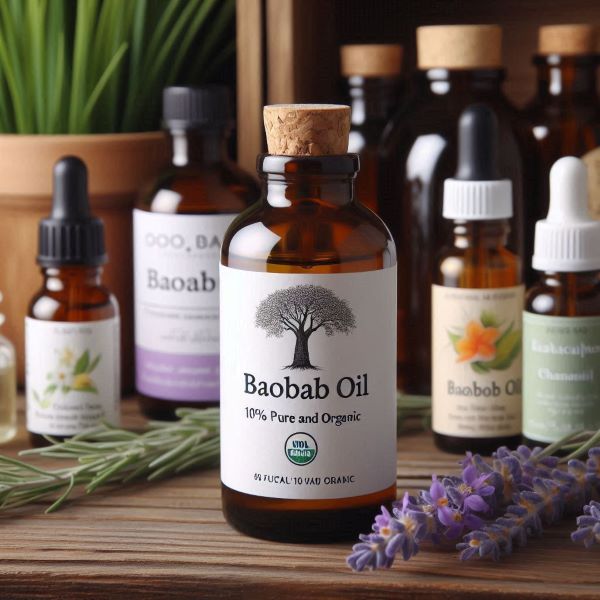Baobab oil is derived from the seeds of the baobab tree (Adansonia), often referred to as the “Tree of Life” due to its numerous uses and nutritional benefits. Native to Africa, this oil has been used for centuries in traditional medicine and skincare. Today, it is gaining popularity worldwide for its rich nutrient profile and various health and beauty benefits. This comprehensive article explores the nutritional profile, benefits, uses, therapeutic advantages, properties, side effects, interesting facts, and scientific evidence related to baobab oil.
Nutritional Profile of Baobab Oil
It is packed with nutrients that contribute to its health benefits:
- Fatty Acids:
- Omega-6 (Linoleic Acid): Approximately 30-35%
- Omega-9 (Oleic Acid): Around 30-40%
- Saturated Fats: Palmitic and stearic acids
- Vitamins:
- Vitamin E (Tocopherols and Tocotrienols): Powerful antioxidants that protect cells from oxidative stress
- Vitamin A: Supports skin health and vision
- Phytosterols: Plant compounds that help reduce cholesterol absorption
- Minerals: Trace amounts of calcium, magnesium, and potassium
Benefits of Baobab Oil
1. Skin Health
- Moisturizing: Deeply hydrates and nourishes the skin, making it ideal for dry and sensitive skin.
- Anti-aging: The high antioxidant content helps reduce the appearance of fine lines and wrinkles.
- Healing Properties: Promotes wound healing and can treat skin conditions like eczema and psoriasis.
- Non-comedogenic: Does not clog pores, making it suitable for acne-prone skin.
2. Hair Health
- Nourished Hair: Strengthens the hair shaft, reducing breakage and promoting healthy hair growth.
- Scalp Health: Moisturizes the scalp, helping to treat dandruff and dry scalp conditions.
- Adds Shine: Leaves hair looking shiny and healthy.
3. Anti-Inflammatory Properties
- Reduces Inflammation: The anti-inflammatory properties help soothe irritated skin and reduce redness.
4. Antioxidant Protection
- Fights Free Radicals: The vitamin E content provides strong antioxidant protection, reducing oxidative stress and cellular damage.
Uses of Baobab Oil
Skincare
- Moisturizer: Applied directly to the skin or mixed with lotions and creams for deep hydration.
- Anti-Aging Products: Included in anti-aging serums and creams for its wrinkle-reducing properties.
- Healing Ointment: Used to treat minor cuts, scrapes, and burns.
Hair Care
- Hair Masks: Used in DIY hair masks to nourish and strengthen hair.
- Scalp Treatment: Applied to the scalp to moisturize and treat dandruff.
Culinary Uses
- Edible Oil: Used in cooking and as a salad dressing, although this is less common due to its higher cost compared to other oils.
Therapeutic Advantages
Baobab oil offers several therapeutic benefits:
- Anti-Inflammatory: Reduces inflammation and may help with conditions like arthritis.
- Antioxidant: Protects cells from oxidative damage, supporting overall health.
- Wound Healing: Speeds up the healing process of wounds and burns.
- Moisturizing: Effective in treating dry skin and hair.
Also, read: All You Need to Know about Macadamia Nut Oil Now
Properties of Baobab Oil
- Emollient: Deeply moisturizing and nourishing for skin and hair.
- Anti-Inflammatory: Reduces inflammation and soothes irritated skin.
- Antioxidant: Rich in antioxidants like vitamin E and phytosterols.
- Non-comedogenic: Does not clog pores, making it suitable for all skin types.
- Stable Shelf Life: Resistant to oxidation, making it less likely to become rancid compared to other oils.
Side Effects
While it is generally safe, some individuals may experience:
- Allergic Reactions: Those with nut allergies should exercise caution and perform a patch test before using baobab oil.
- Skin Sensitivity: This can cause irritation or sensitization for some individuals when applied topically.
Interesting Facts
- Ancient Use: It has been used in African traditional medicine for centuries to treat various ailments.
- Tree of Life: The baobab tree can live for over 1,000 years and provides food, water, and shelter to many communities in Africa.
- Sustainable: It is considered sustainable because the trees grow wild and do not require extensive agricultural inputs.
Scientific Evidence
Numerous studies support the health benefits of baobab oil:
- Antioxidant Properties: Research published in the Journal of Food Research highlights the high antioxidant capacity of baobab oil, attributing it to its rich vitamin E content. (Source)
- Skin Benefits: A study in the International Journal of Cosmetic Science demonstrated that baobab oil effectively improves skin hydration and elasticity. (Source)
- Anti-Inflammatory Effects: Studies have shown that the fatty acids in baobab oil have significant anti-inflammatory properties, making it beneficial for conditions like eczema and psoriasis. (Source)
Conclusion
Baobab oil is a nutrient-rich oil with a wide range of health and beauty benefits. Its high content of essential fatty acids, antioxidants, and vitamins makes it a valuable addition to both skincare and haircare routines. From promoting skin health to enhancing hair, baobab oil offers numerous advantages backed by scientific research. While generally safe, it is important to use baobab oil properly and be aware of potential side effects. Incorporating baobab oil into your daily life can lead to improved health, well-being, and overall vitality.





